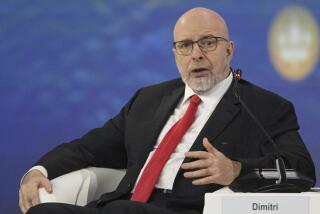Russia dismisses chances of swap involving detained American
Russia downplayed the possibility of swapping a detained American held on espionage charges for a Russian national behind bars in the United States.
The remarks by Russia’s Foreign Ministry Saturday came after the disclosure of the arrest of a Russian citizen in the Northern Mariana Islands by U.S. officials and his transfer to Florida, deepening the complexity surrounding the mysterious arrest of Paul Whelan, an American, last week in Moscow.
An FBI spokeswoman declined to comment on the arrest of Dmitry Makarenko on Dec. 29, which Russia’s Foreign Ministry disclosed Saturday.
U.S. court records show Makarenko, who lives in Russia, was indicted in Miami in 2017 on charges that he broke American laws against exporting military equipment. He was also charged with money laundering.
There has been widespread speculation that the 48-year-old Whelan, who was arrested Dec. 28 under the relatively broad charge of espionage with zero details on what he is accused of doing, would be exchanged for a Russian citizen.
“To speak about any kind of ‘swaps’ [at] this stage is inappropriate and wrong,” Russia’s Deputy Foreign Minister Sergei Rybakov told the state-run RIA news agency.
Whelan’s arrest came weeks after Russian national Maria Butina, 30, pleaded guilty in a U.S. court to acting as an agent for the Kremlin in conspiring with a senior Russian official to infiltrate conservative American circles ahead of the 2016 presidential campaign.
Whelan’s case, which continues to zigzag as details about his past emerges, has further heightened tensions between Washington and Moscow: The United States and Russia are at loggerheads over a range of issues from election meddling to the crises in Syria and Ukraine.
Whelan, a Michigan resident who served in the Marines, was court-martialed and discharged for trying to steal thousands of dollars from the U.S. government. He also owns British, Canadian and Irish citizenships.
The Russian Embassy in Washington found out about Makarenko’s detention from those close to him, and not the U.S. government, violating the Vienna convention of giving notification within 72 hours of a foreign national’s arrest. “This is not the first time the U.S. does this,” the Foreign Ministry said in a statement. “The United States’ neglect of its international obligations has become the norm.”
Four days passed before Whelan was visited by U.S. government officials. The U.S. ambassador to Russia, Jon Huntsman Jr., met with Whelan on Wednesday in his cell at a Moscow detention facility. Neither Washington nor Moscow have provided a reason for the delay in that meeting.
Russia’s security services arrested Whelan when he was in Moscow on a personal visit, his family and company have said.
U.S. Secretary of State Mike Pompeo said Washington would demand his release if his detention is deemed inappropriate, while London has said its citizens should not be used as pawns.
Ferris-Rotman writes for the Washington Post.
More to Read
Sign up for Essential California
The most important California stories and recommendations in your inbox every morning.
You may occasionally receive promotional content from the Los Angeles Times.










